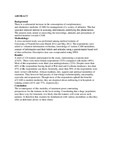| dc.identifier.citation | Nyongesa,H.,Munguti,C.,2013.Attitudes And Perceptions Of Medical Trainees Towards Complementary And Alternative Medicine Use,paper presented at the 2nd Bi-ennual International Scientific Conference 2013, Nairobi Kenya. | en_US |
| dc.description.abstract | Background:
There is a substantial increase in the consumption of complementary
and alternative medicine (CAM) for management of a variety of ailments. This has
spawned renewed interest in assessing determinants underlying this phenomenon.
The present study aimed at unraveling the knowledge, attitudes and perceptions of
medical trainees towards CAM.
Methodology:
A cross sectional study was performed among medical trainees of
University of Nairobi between March 2012 and May 2012. The respondents were
asked to volunteer information on biodata, knowledge of various CAM modalities,
sources of information and their beliefs and attitudes using a questionnaire based tool
of data collection. Descriptive data was compounded using SPSS.
Results:
A total of 124 trainees participated in the study, representing a response rate
of 82%. There were more female respondents (52%) compared with males (48%).
Most of the respondents were third year undergraduates (22%). Despite more than
60% of the respondents having heard of Pub med and Cochrane databases, less than
47% of the respondents use them. Generally, more than 50% of the respondents were
more versed with herbal, African tradition, diet, support and spiritual modalities of
treatment. They however had paucity of knowledge on homeopathy, naturopathy,
ayurveda and acupuncture. Though most of the respondents uphold the benefits
of CAM to modern medicine, they are skeptical about embracing it in hospitals or
training centers (61% and 77%, respectively).
Conclusion:
The re-emergence of this modality of treatment poses contrasting
perspectives for the trainees in the local setting. Considering that a huge population
uses these way for treatment, it is likely that the trainees will come across such
patients. It therefore that students be familiarized with various modalities so that they
offer an informed advice to their clients | en_US |

